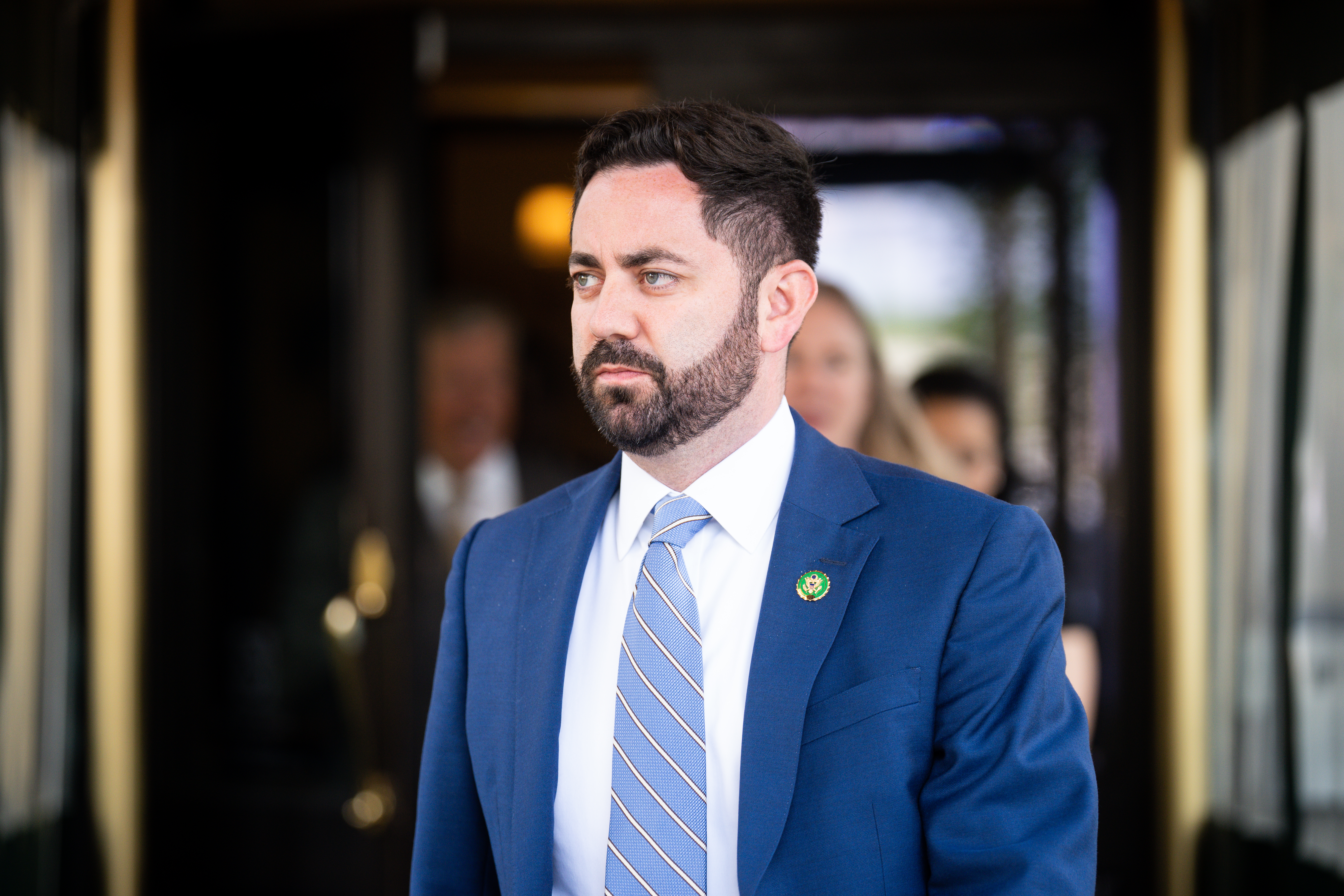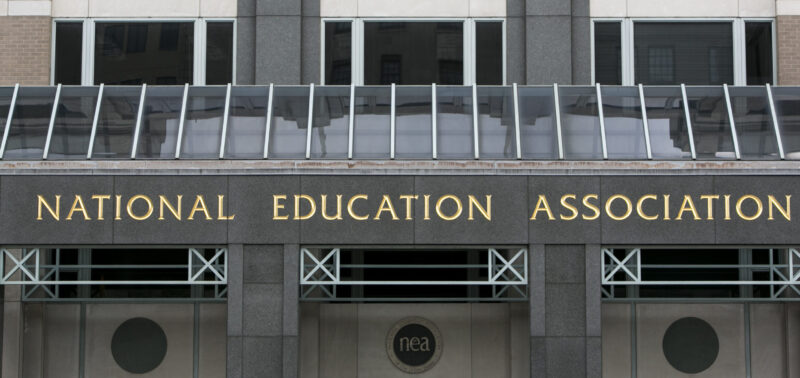Plus, Leonardo DiCaprio's new Herzliya hotel

Kevin Carter/Getty Images
U.S. Capitol Building on January 18, 2025 in Washington, DC.
Good Wednesday morning.
In today’s Daily Kickoff, we talk to college students about the Trump administration’s efforts to reach settlements with schools over their handling of antisemitism on campus, and have the scoop on new legislation, introduced by Reps. Virginia Foxx and Josh Gottheimer, that would restrict federal funding to universities that engage in boycotts of Israel. We also report on the death of Blackstone executive and Jewish communal lay leader Wesley LePatner, who was killed in Monday’s shooting at the company’s headquarters, and look at stalled congressional efforts to address antisemitism. Also in today’s Daily Kickoff: Leonardo DiCaprio, Michel Issa, Illinois Gov. JB Pritzker and Penny Pritzker.
What We’re Watching
- The Senate is expected to vote today on two resolutions from Sen. Bernie Sanders (I-VT) on blocking arms sales to Israel. More below.
- House Minority Leader Hakeem Jeffries (D-NY) is slated to meet with Democrats in Texas today amid a broader debate over mid-decade redistricting, following President Donald Trump’s call for the Lone Star State to redraw the state’s congressional districts to give Republicans up to five additional seats.
What You Should Know
A QUICK WORD WITH JI’S MARC ROD
It’s been two months since the Capital Jewish Museum shooting in Washington and the Boulder, Colo., firebombing attack.
The two attacks prompted unified condemnation from lawmakers and calls from the Jewish community for Capitol Hill to take aggressive action against the escalating antisemitism crisis in the United States.
But as Congress heads into its August break, that initial momentum has produced little concrete action.
The House and Senate have passed resolutions condemning the attacks, but key legislation related to antisemitism remains stalled, even as lawmakers individually and in groups continue to press for action.
There are still no clear prospects for passage of the Antisemitism Awareness Act, a key element of congressional efforts to address antisemitism, after a contentious Senate committee hearing in April in which Democrats, joined by Republicans including Sen. Rand Paul (R-KY), voted to add amendments that most Republicans supporting the bill view as nonstarters. House leaders have made no public moves to advance the legislation.
And despite calls from Jewish groups for significant increases in nonprofit security funding to as much as $1 billion next year and a push from a bipartisan coalition of lawmakers for $500 million, the funding levels under consideration in the House are little different from those discussed in prior years.
Read more from JI senior congressional correspondent Marc Rod here.
MORE THAN MONEY
Pro-Israel students: University reforms must go beyond cash payments

When hundreds of pro-Israel college students from around the country gathered in Washington earlier this week for the Israel on Campus Coalition’s three-day annual national leadership summit, the rise of antisemitism on campuses sparked by the aftermath of the Oct. 7 terrorist attacks nearly two years ago was still a topic of conversation throughout panels and hallways. This year, however, some students, in conversations with Jewish Insider’s Haley Cohen, also said that antisemitism is lessening — though they offered mixed views about what is leading to the improved campus climate.
Students’ perspectives: Some attributed it to the Trump administration’s ongoing pressure campaign on universities to crack down on antisemitic behavior, which has included federal funding cuts from dozens of schools. Others said their campuses started to take a serious approach to antisemitism, before President Donald Trump was reelected, in the fall semester following the wave of anti-Israel encampments from the previous spring. But many student leaders from universities that have been targeted by the Trump administration — facing billions of dollars in slashed funds — said that if their school enters into negotiations to restore the money, they would like a deal to include structural reforms, unlike the one made last week between the federal government and Columbia University.
Suit settled: The University of California, Los Angeles settled a federal lawsuit this week with Jewish students who alleged that the university permitted antisemitic conduct during the spring 2024 anti-Israel encampments on the campus, according to a settlement agreement shared by the university on Tuesday, Jewish Insider’s Gabby Deutch reports.
EXCLUSIVE
Foxx, Gottheimer aim to restrict federal funding to colleges that boycott Israel

Reps. Virginia Foxx (R-NC) and Josh Gottheimer (D-NJ) introduced legislation on Tuesday that would make colleges that engage in a “nonexpressive commercial boycott” of Israel ineligible to receive federal student aid funding, Jewish Insider’s Marc Rod and Emily Jacobs report.
About the bill: The legislation, the Protect Economic and Academic Freedom Act, would require schools to certify annually that they are not engaged in such boycotts, and would instruct the Department of Education to annually publish a list of schools that fail to submit such certification. The legislation would apply both to boycotts of Israel as a country or companies and other entities operating under Israeli law.
ELEVATING THE ISSUE
Senate Democrats call out humanitarian crisis in Gaza, say GHF failed

A group of 40 Senate Democrats, nearly all of the caucus, wrote to administration officials on Tuesday raising concerns about the humanitarian situation in Gaza and calling for a significant expansion of aid, describing the Gaza Humanitarian Foundation as a failure, Jewish Insider’s Marc Rod reports.
What they said: The letter to Secretary of State Marco Rubio and Middle East envoy Steve Witkoff, led by Sens. Adam Schiff (D-CA), Brian Schatz (D-HI), Chuck Schumer (D-NY) and Jacky Rosen (D-NV), highlights the extent of the concern even among Democratic leaders and pro-Israel stalwarts. The lawmakers called for aid to be significantly expanded through “experienced multilateral bodies and NGOs.” A group of 21 progressive Democrats went further earlier this week, calling for the U.S. to stop all funding for the GHF.
Déjà vu: Sen. Bernie Sanders (I-VT) introduced a joint resolution of disapproval on Monday to block an arms transfer to Israel, setting up a Senate floor battle on Wednesday over U.S. aid to Israel — the third since November of last year, Jewish Insider’s Marc Rod reports.
through thick in thin
Rep. Ritchie Torres offers muscular defense of Israel amid flurry of Dem criticism

In comments to a supportive crowd of pro-Israel college students in Washington, Rep. Ritchie Torres (D-NY) said Tuesday that the world needs to be reminded that “Hamas is the central cause of the war in Gaza,” Jewish Insider’s Haley Cohen reports.
What he said: “We have to remind the world that despite the amnesia, Hamas is the central cause of [Israel’s] war in Gaza. The primary responsibility for a war lies with its cause … Hamas is morally responsible, principally responsible for the war in Gaza,” Torres, a pro-Israel Democratic stalwart in Congress, told about 700 attendees gathered in Washington for the Israel on Campus Coalition’s three-day annual national leadership summit.
More from Torres: Torres warned, in an interview with The Bulwark on Tuesday, that the war in Gaza appears to be turning into a “quagmire” akin to the Iraq war, without clear objectives or any realistic end point, Jewish Insider’s Marc Rod reports.
IN MEMORIAM
Jewish philanthropist Wesley LePatner killed in Manhattan shooting

Wesley LePatner, a Blackstone executive who was involved with Jewish communal organizations in New York City, was killed in the Monday shooting at the firm’s Midtown headquarters, the company confirmed on Tuesday, Jewish Insider’s Gabby Deutch reports. LePatner was the global head of Core+ Real Estate at Blackstone and CEO of Blackstone Real Estate Income Trust, according to Blackstone’s website. A Yale graduate, she joined the company in 2014 after more than a decade at Goldman Sachs. She served on the board of trustees at the Abraham Joshua Heschel School, a pluralistic Jewish day school in New York, and she joined the board of directors at UJA-Federation of New York earlier this month.
Legacy: “Wesley was extraordinary in every way — personally, professionally, and philanthropically,” the federation said in a statement. “In the wake of Oct. 7, Wesley led a solidarity mission with UJA to Israel, demonstrating her enduring commitment in Israel’s moment of heartache. She lived with courage and conviction, instilling in her two children a deep love for Judaism and the Jewish people.”
More from Blackstone: The company’s president, Jonathan Gray, said that LePatner was well-liked at the firm, where she “just instilled such a sense of confidence in her” and “wanted other people to win.”
AMBASSADORIAL ASSESSMENT
Lebanon ambassador nominee: There is a ‘narrow but meaningful window for progress’

Michel Issa, the Lebanese-American businessman nominated by the Trump administration to serve as U.S. ambassador to Lebanon, said Tuesday that the Lebanese government and armed forces must act swiftly and decisively to disarm Hezbollah and remove its influence across Lebanese society, Jewish Insider’s Marc Rod reports.
Looking ahead: Issa argued at his Senate Foreign Relations Committee confirmation hearing that the war between Israel and Hezbollah, “while devastating, has opened a narrow but meaningful window for progress,” in combination with the Israel-Lebanon ceasefire deal, the fall of the Assad regime in Syria and recent blows to Iran’s military and nuclear program.
Worthy Reads
Bibi’s Bind: The Atlantic’s Yair Rosenberg considers the challenge facing Israeli Prime Minister Benjamin Netanyahu as he attempts to prosecute the war in Gaza and keep his government — which includes far-right members with a different vision for the enclave — from collapsing. “Every step he authorized had to be dual use: ostensibly for a strategic purpose but also capable of potentially advancing the far right’s plan. In practice, pursuing these two goals at the same time is incompatible with a just and successfully prosecuted war: It is impossible to provide aid and also withhold it, to pursue a limited war against Hamas to free hostages and also a war of conquest. The longer the conflict has gone on, the more obvious the compromised nature of Netanyahu’s decision making has become.” [TheAtlantic]
Keir’s Veer: The Wall Street Journal’s editorial board critiques British Prime Minister Keir Starmer’s declaration that the U.K. will recognize a Palestinian state unless Israel meets certain conditions before September. “Framing recognition as a threat to Israel — unless it does x, y and z — lays bare the move’s punitive nature. At least this means we can dispense with the usual pabulum that planting a hostile state in the heart of Israel is a gift for which Israelis would be grateful if only they could see their true interests as clearly as they appear from Paris and London. It is also striking to demand that Israel accept a cease-fire when it has done so over and over, only for Hamas to torpedo talks. That was the Biden team’s conclusion and now the Trump team’s as well. When Israel made difficult concessions last week, Hamas reneged on what it had agreed to previously. The U.K. now gives Hamas a reason to reject future cease-fires; if the terrorists hold out, Mr. Starmer will give them a reward.” [WSJ]
Word on the Street
The New York Times published an editor’s note regarding a story about malnutrition in Gaza that failed to note that one of the children featured in the article — whose pictures went viral — suffered from preexisting health conditions affecting his brain and his muscle development…
In a thread on X laying out his positions on the war in Gaza, Rep. Greg Landsman (D-OH) argued that “Qatar should take into custody every Hamas leader in Qatar until every hostage is released and the war is over”…
The Times of Israel published a document signed at this week’s U.N. conference on a two-state solution by 17 countries, including Qatar, Saudi Arabia and Egypt, calling for Hamas to disarm and end its rule over the Gaza Strip…
President Donald Trump said that the U.S. would partner with Israel on “a new aid plan” to open new food distribution sites in the Gaza Strip…
Defense Secretary Pete Hegseth has reportedly discussed mounting a gubernatorial run in Tennessee next year, when Gov. Bill Lee, a Republican, will be term-limited…
New guidance released this week by the Office of Personnel Management expressed support for religious expression, including proselytization, in federal workplaces…
A new poll from Gallup found record-low U.S. support for Israel’s war against Hamas in Gaza since it first polled on the issue in November 2023; 60% of Americans surveyed earlier this month disapprove of Israel’s military actions in Gaza, up from 45% in November 2023…
The Wall Street Journal looks at Illinois Gov. JB Pritzker and former Commerce Secretary Penny Pritzker’s push to bring quantum computing technology to Chicago…
Italian authorities are investigating as a hate crime an attack on a French Jewish man and his young son that occurred at a rest stop north of Milan; according to video of the incident, the man was assaulted after several individuals, including a cashier at the rest stop, shouted “Free Palestine” at him and his child…
Jewish leaders at the University of Edinburgh are urging the school not to drop its support for the International Holocaust Remembrance Alliance’s working definition of antisemitism, following a report that the school is reconsidering its prior adoption of the definition…
The European Commission proposed barring Israeli participation in the Horizon Europe research program over the humanitarian situation in the Gaza Strip…
The Tel Aviv District Planning and Building Committee approved construction plans for a new luxury hotel in Herzliya being built by the Hagag Group in partnership with actor Leonardo DiCaprio…
Israeli media reports that the country’s ambassador to the United Arab Emirates, Yossi Shelley, will soon be sent back to Jerusalem following a months-old incident at an Abu Dhabi bar in which Shelley acted in an “undignified” manner; the Prime Minister’s Office denied both the report and that Shelley is being removed from the posting…
Israeli actor Alon Aboutboul, who appeared in such films as “The Dark Knight Rises” and “Munich,” died at 60…
Crown Heights, N.Y., community member Ben “Ziggy” Faulding died at 41…
Pic of the Day

Sen. Dave McCormick (R-PA), addressing attendees on Tuesday at the Israel on Campus Coalition’s three-day annual national leadership summit in Washington, said that Israel’s response to the Oct. 7, 2023, Hamas terror attacks “changed the landscape in ways that could be for the good” and lead to the “possibility of a secure region,” Jewish Insider’s Haley Cohen reports from the conference.
Birthdays

Commissioner emeritus of Major League Baseball, his 2019 memoir is For the Good of the Game, Allan Huber “Bud” Selig turns 91…
Retired attorney from the firm of Hatton, Petrie & Stackler in Aliso Viejo, Calif., Ronald E. Stackler turns 88… Longtime owner and editor-in-chief of The New Republic, he was chairman of the Jerusalem Foundation for 12 years, Martin H. “Marty” Peretz turns 86… The first woman justice on the Nebraska Supreme Court, as a teen she won two gold medals and a silver medal as a swimmer at the Maccabiah Games in Israel, Justice Lindsey Miller-Lerman turns 78… Actor, director and producer, Ken Olin turns 71… Philanthropist and investor, of Uzbek Bukhari background, known as the “King of Diamonds,” Lev Leviev turns 69… Former mayor of Arad, Israel, and then a member of the Knesset for the Kulanu and Likud parties, Tali Ploskov turns 63… President of C&M Transcontinental, he served as COO for the first two Trump campaigns, Michael S. Glassner turns 62… Emmy Award-winning actress, comedian and producer, Lisa Kudrow turns 62… Head coach of men’s tennis and director of tennis operations at Columbia University, Howard Endelman turns 60… Best-selling nonfiction author, contributing editor at Vanity Fair and Rolling Stone magazines, he is a co-creator of the HBO series “Vinyl,” Rich Cohen turns 57… District director for Rep. Jerrold L. Nadler (D-NY), Robert M. Gottheim turns 54… Assistant attorney general for antitrust at the Department of Justice during most of the Biden administration, Jonathan Seth Kanter turns 52… Motivational speaker, author and entrepreneur, he served as a law clerk in 2008 for Justices O’Connor and Ginsburg, the first blind person to clerk for the U.S. Supreme Court, Isaac Lidsky turns 46… President of MSNBC since February, Rebecca M. Kutler… Member of the Knesset for the Otzma Yehudit party, Limor Son Har-Melech turns 46… Senior producer at Vox and host and producer of the podcast of the Association for Jewish Studies, Avishay Artsy… President and founder in 2014 of Dallas-based ECA Strategies, Eric Chaim Axel… Team supervisor at Pittsburgh Mercy Health System, Lewis Sohinki… Author of Jerusalem Drawn and Quartered: One Woman’s Year in the Heart of the Christian, Muslim, Armenian and Jewish Quarters of Old Jerusalem, Sarah Tuttle-Singer turns 44… Former director of policy and public affairs for the Jewish Community of Denmark, now in the renewable energy and offshore wind industry, Jonas Herzberg Karpantschof… Attorney and member of the Los Angeles County GOP Central Committee for Assembly District 42, which includes Pacific Palisades, Elizabeth Barcohana turns 42… Head of digital operations at the Ministry of Foreign Affairs of Israel until this past April, Tamar Schwarzbard… Managing principal of West Egg Development, Samuel Ezra Eshaghoff turns 33… Director of business development at Israel’s economic mission to the South and Midwest U.S., Joshua Weintraub… Winner of the Miss Israel pageant in 2014, now a businesswoman, Mor Maman turns 30… Actress, as a 10-year-old she starred as Ramona Quimby in the comedy film “Ramona and Beezus,” Joey Lynn King turns 26…
ADL CEO Jonathan Greenblatt: ‘I'd like to see the extremes marginalized so the vast majority of members of Congress on both sides can get the stuff done that needs to happen’

Marc Rod
Lawmakers gather on the Capitol steps on June 10, 2025 for a vigil for Yaron Lischinsky and Sarah Milgrim, Israeli Embassy staffers who were killed in an anti-Israel attack.
It’s been two months since the Capital Jewish Museum shooting in Washington and the Boulder, Colo. firebombing attack.
The two attacks prompted unified condemnation from lawmakers and calls from the Jewish community for Capitol Hill to take aggressive action against the escalating antisemitism crisis in the United States. But as Congress heads into its August break, that initial momentum has produced little concrete action.
The House and Senate have passed resolutions condemning the attacks, but key legislation related to antisemitism remains stalled, even as lawmakers individually and in groups continue to press for action.
There are still no clear prospects for passage of the Antisemitism Awareness Act, a key element of congressional efforts to address antisemitism, after a contentious Senate committee meeting in April in which Democrats, joined by Republicans including Sen. Rand Paul (R-KY), voted to add amendments that most Republicans supporting the bill view as nonstarters. House leaders have made no public moves to advance the legislation.
And despite calls from Jewish groups for significant increases in nonprofit security funding to as much as $1 billion next year and a push from a bipartisan coalition of lawmakers for $500 million, the funding levels under consideration in the House are so far little different from those discussed in prior years.
One Republican senator working on the Antisemitism Awareness Act told Jewish Insider they have not seen much movement among colleagues who have continued concerns about the legislation, in conversations with those colleagues and the White House.
The senator said they are frustrated by unresolved disputes about the International Holocaust Remembrance Alliance’s working definition of antisemitism on the Republican side of the aisle, noting as well that there are steps the administration can take independently.
Jonathan Greenblatt, the CEO of the Anti-Defamation League, said at a press conference last week that “there needs to be, for sure” more focus from Congress on tackling antisemitism. A key part of that, he said, will be sidelining extreme voices.
“I think too often extremes on both ends kind of warp the conversation and insist that the definition of antisemitism somehow needs to include things like the false charge of ‘the Jews murdered Jesus,’ or the claim that anti-Zionism is never antisemitism,” Greenblatt said, alluding to the objections from both sides of the aisle to the Antisemitism Awareness Act.
“All the Jews didn’t murder Jesus, and anti-Zionism is antisemitism. I think I’d like to see the extremes marginalized so the vast majority of members of Congress on both sides can get the stuff done that needs to happen once and for all,” he continued.
Several sources familiar with the situation said that the bill is “stuck,” for the moment. Senate Republicans could attempt to bring the bill to the floor and utilize procedural means to eliminate the poison-pill amendments added to the bill in the Senate Health, Education Labor and Pensions Committee, but that would require Democratic support and could rehash the same ugly debates seen in the HELP committee.
It could also be added to a must-pass legislative package — but that same plan failed last year.
A source who has advocated for the legislation said that the recently passed budget reconciliation package sapped attention for antisemitism legislation in recent months, but argued that passing the Antisemitism Awareness Act is critical because there are no realistic alternative proposals for tackling antisemitism on Congress’s agenda at this point.
The Senate has also been focused on confirming presidential appointees.
The source said that advocates for the bill need to find strategies to work around the obstacles to the legislation, “and that has not been easy,” but insisted that they and others are not giving up on the bill.
“There just hasn’t been a lot of legislation [moving] in general,” Nathan Diament, the executive director of public policy for the Orthodox Union, said — arguing that the slow progress is not unique to the Antisemitism Awareness Act or antisemitism generally.
Sen. Jacky Rosen’s (D-NV) office told JI that she is continuing to advocate for the Antisemitism Awareness Act, and is also looking at potential other legislation that could move forward on antisemitism. Rosen, the co-chair of the Senate antisemitism task force, is the lead Democratic sponsor of the Antisemitism Awareness Act.
Senate Republicans had vowed, coming into the majority, to pass the bill.
“Republican control of the Senate means that this institution will no longer turn a blind eye to the growing threat of antisemitism in our country or the numerous threats that our ally Israel faces on all sides,” Senate Majority Leader John Thune (R-SD) told JI after Republicans won the Senate majority. “We will empower committees to advance legislation addressing antisemitism and protecting students on campuses, and we will increase oversight into Iran’s malign actions.”
On the House side, Rep. Mike Lawler (R-NY) told JI last week that “we’re working on” the Antisemitism Awareness Act. Pressed on whether Congress is moving strongly enough to respond to antisemitic violence, Lawler said, “It continues to be a strong focus of mine and many of my colleagues, and we’re working through the legislation.”
House Speaker Mike Johnson (R-LA) did not respond to a request for comment.
Observers believe the House, which passed the bill last year only for it to fail to move forward in the Senate, is waiting on the Senate to move first this year and prove that it can pass the bill.
Another source argued that, given the action the administration has taken to address antisemitism on college campuses, the Antisemitism Awareness Act is “less necessary” in the near term.
On NSGP funding, the House Appropriations Committee approved a bill that would allocate $335 million for the program in 2026 — the same funding level that the House backed for the program in 2025, though final funding levels ultimately fell short of that mark.
The Senate Appropriations Committee, meanwhile, has yet to finalize its homeland security funding bill. Sen. Chris Murphy (D-CT), the ranking member of the subcommittee responsible for such funding, told JI last week that lawmakers are “still negotiating” it.
Congress will have just a month to finalize government funding or pass a stopgap bill when it returns from August recess.
A Republican senator working on the issue said they’ve been focusing on ensuring that outstanding NSGP funding for this year is disbursed from the administration before turning to the appropriations process for next year.
“First things first on it, let’s get the grant money out so people can actually create a more secure environment where they’re physically located,” the senator said. The administration opened applications for the 2025 grant program on Monday, but some supplemental funding remains to be allocated.
Diament said that Congress is in the “fourth or fifth inning out of nine” on government funding, and that the process will likely play out mostly in September or October. He also argued that, given the “tight fiscal environment,” particularly for homeland security funding, the fact that advocates were able to secure a $30 million increase in NSGP funding from the initial proposed level of $305 million, on a bipartisan basis in the House Appropriations Committee is very “valuable in the process going forward.”
In “the later innings of the process, it laid very good groundwork” for further bipartisan movement to increase funding as the process proceeds, Diament continued. “We made sure to work it on a bipartisan basis and we’re moving in the right direction.”
“Given everything else on the legislative calendar and where we are on the legislative calendar, I don’t feel like we’re behind,” he continued.
Rep. Don Bacon (R-NE), a co-chair of the House antisemitism task force, asked about congressional action on antisemitism last week, said that “there’s a place for legislation” but argued that other steps are also needed to make antisemitism unacceptable in public discourse.
“In the end, Americans have to speak out on this,” Bacon said at a press conference on legislation aiming to tackle support for terrorism on social media. “We have to make it like it’s embarrassing to be standing on that side saying those things. So we got to speak up. And you can’t legislate that.”
Several Democrats said last week that more needs to be done legislatively to tackle antisemitism.
“We’ve had an unlimited amount of hearings, and the speaker has now come out with a security plan [for members] for the summer, and a lot of that, obviously, is tied to the amount of hate and threats that we are getting, but we still haven’t passed the Antisemitism Awareness Act,” Rep. Jared Moskowitz (D-FL) said. “No, we’re not doing enough to combat antisemitism and other forms right now of hate and demagoguery that’s going on.”
“The language and the culture, it’s just completely toxic,” Moskowitz continued, adding that Congress is “also not doing enough on the security grants. … They gave ICE $140 billion. We’re trying to get more money for security when the community is in grave danger, and these threats are out of control, at all-time levels.”
Sen. Richard Blumenthal (D-CT) said that “there can never be too much focus on antisemitism, and I see, frankly, too little right now, in light of events that are unfolding around the country.”
“I wish there were more focus on bias and bigotry of all forms, because it is growing, and so is violent extremism and the confluence of the two make for a very dangerous recipe for potential disaster,” Blumenthal continued.
Rep. Brad Schneider (D-IL), a co-chair of the House Jewish Caucus, said that “it’s not business as usual” on antisemitism, and that lawmakers are “working on it and we’re trying to take constructive steps.”
But he added that “we have to do more. We’re seeing antisemitism rising all across the country, being normalized in ways that should never be normalized” on both sides of the political spectrum.
Schneider said that “it is critical that everybody, Democrats, Republicans, House, Senate, stand together, stand united against anti semitism and not what about ism in here, we need to stand against hate. But antisemitism is rising at a rate that should give everyone concern.”
He primarily blamed Republicans for the lack of progress on legislation like the Antisemitism Awareness Act.
Jewish Insider’s congressional correspondent Emily Jacobs contributed reporting.
The Protect Economic and Academic Freedom Act would require schools to certify annually that they are not engaged in a ‘nonexpressive commercial boycott’ of Israel

Vincent Ricci/SOPA Images/LightRocket via Getty Images
Students sit and stand around the edges of the encampment with a banner declaring their demands.
Reps. Virginia Foxx (R-NC) and Josh Gottheimer (D-NJ) introduced legislation on Tuesday that would make colleges that engage in a “nonexpressive commercial boycott” of Israel ineligible to receive federal student aid funding.
The legislation, the Protect Economic and Academic Freedom Act, would require schools to certify annually that they are not engaged in such boycotts, and would instruct the Department of Education to annually publish a list of schools that fail to submit such certification.
The legislation would apply both to boycotts of Israel as a country or companies and other entities operating under Israeli law.
Schools would be required to certify to the Department of Education that they allow students to participate in programs including conferences, study abroad, research and collaborative activities in Israel under the same terms as such programs in other countries, and to allow Israeli students to participate in programs on their campuses as applicable.
The bill defines a “nonexpressive commercial boycott” as “commercial action (including engaging in refusals to deal and terminating business activities) … intended to limit commercial relations with a major strategic partner” and “not based on a valid business reason.”
“The antisemitic rot that has corroded college campuses must be eradicated — enough is enough. The safety and security of Jewish students, faculty, and staff should never be threatened under any circumstances,” Foxx said in a statement. “If an institution of higher education chooses to capitulate to the caustic BDS movement, there will be consequences — starting with this bipartisan legislation.”
Gottheimer said in a statement that the Boycott, Divestment and Sanctions movement seeks to destroy Israel and that it has no place on college campuses or in the United States.
“At a time when our Jewish students are facing death threats, being physically assaulted, and blocked from going to class simply for who they are, we must do everything possible to ensure they can learn safely, speak freely, and get the education they deserve,” Gottheimer continued.
“That’s why I’m proud to help introduce the bipartisan Protect Economic and Academic Freedom Act to give the Department of Education a critical new tool to combat the dangerous, hate-fueled, antisemitic BDS movement on college campuses,” he said. “We cannot allow antisemitism to run rampant and endanger Jewish students, staff, and faculty. Now more than ever, we must stand up and protect our Jewish community.”
The legislation also includes language stating that, “limitations on cooperative efforts by institutions of higher education, consortia of such institutions, or partnerships between non-profit educational organizations and institutions of higher education with [Israel] do not serve the security, stability, and economic vitality of the United States.’’
The STUDENT Act also expands the NEA charter to prohibit the ‘promotion of antisemitic beliefs’ and Holocaust denial

Kayla Bartkowski/Getty Images
U.S. Sen. Cynthia Lummis (R-WY) speaks with press after voting on the nomination of Tulsi Gabbard as President Donald Trump’s director of national intelligence at the Senate Chambers on February 12, 2025 in Washington, DC.
Sen. Cynthia Lummis (R-WY) will introduce legislation on Thursday requiring the National Education Association to expand its federal charter to prohibit the nation’s largest teachers’ union from “engaging in electoral politics or lobbying” in response to the group’s proposal to cut ties with the Anti-Defamation League, Jewish Insider has learned.
Lummis began working on the STUDENT Act in response to the NEA’s representative assembly, the union’s governing body, voting earlier this month at an annual leadership conference to adopt a measure barring teachers from using, endorsing or publicizing any materials from the ADL. The NEA’s board of directors announced on Friday it would not implement the contentious resolution after determining that it “would not further NEA’s commitment to academic freedom, our membership or our goals.”
In addition to the moratorium on involvement in political causes, the bill would add language to the NEA charter banning the “promotion of antisemitic beliefs, including harmful stereotypes about Jewish people, Holocaust denial or minimization, and hatred based on Jewish identity or connection to Israel,” according to a readout from Lummis’ office. It would also bar the organization from “promoting or requiring adherence to critical race theory concepts,” eliminate the union’s tax-exempt status in Washington, prevent them from “calling strikes or work stoppages” and require “all NEA officers to be U.S. citizens.”
Lummis said in a statement on the bill that the NEA had “exploited its federal charter to advance a radical political agenda that puts ideology before education.”
“Federal charters should be reserved for organizations that serve patriotic, charitable, historical, or educational purposes — not for unions that push divisive and antisemitic ideologies,” Lumis said.
Lummis told JI she found the NEA’s original decision on the ADL “to be completely ridiculous and misguided.”
“The fact that such a resolution passed the representative assembly — made up of thousands of NEA members — was reason enough for me to be concerned. Our educational institutions should be strengthening their partnerships with organizations committed to protecting Jewish Americans and combating hatred, not severing these important ties,” Lummis explained, referencing the more than 6,000 union delegates who took part in the three voice votes that were ultimately called in favor of the measure.
The Wyoming senator said the developments prompted her “to examine the NEA’s charter more closely, which revealed how significantly the organization has deviated from its original mission and misused its federally granted charter privileges.”
“It’s evident that the NEA lacks the leadership and vision necessary for self-correction, which is why I’m proposing this legislation. We cannot allow the NEA and other federally chartered organizations to slide toward antisemitic positions,” she told JI.
Sens. Jim Risch (R-ID), Pete Ricketts (R-NE), Ted Cruz (R-TX) and Tim Sheehy (R-MT) cosponsored the bill. Rep. Scott Fitzgerald (R-WI) is working on companion legislation on the House side.
“The NEA long ago transformed from an educational association into a political machine, pushing a progressive agenda that puts activists ahead of students’ needs. The STUDENT Act reins in NEA’s federal charter, restores accountability, and demands a return to its original purpose: educating, not indoctrinating, American children,” Fitzgerald said in a statement.

Bill Clark/CQ-Roll Call, Inc via Getty Images
Rep. Mike Lawler (R-NY) leaves the House Republicans' caucus meeting at the Capitol Hill Club in Washington on Tuesday, May 23, 2023.
The House Foreign Affairs Committee voted on Tuesday to advance legislation that aims to expedite arms sales to U.S. partners that are members of the Abraham Accords, as well as bills to review the U.S.-South Africa relationship and to combat the proliferation of Western-made parts in Iranian drones.
The arms sales bill comes as part of a broader push by House Republicans to speed up military transfers to U.S. allies. It would cut the congressional review period for sales to Abraham Accords partners that work with the U.S. on countering Iran and its proxies from 30 days to 15, in line with the review period for key U.S. defense partners including NATO members.
The bill, led by Rep. Mike Lawler (R-NY), advanced by a 31-19 vote, with Republican Reps. Scott Perry (R-PA), Tim Burchett (R-TN) and Warren Davidson (R-OH) voting against the bill and Democratic Reps. Ted Lieu (D-CA), Sheila Cherfilus-McCormick (D-FL), Greg Stanton (D-AZ), Jared Moskowitz (D-FL), Jim Costa (D-CA), George Latimer (D-NY) and Brad Schneider (D-IL) supporting it.
Rep. Brian Mast (R-FL), the committee chairman, argued that arms sales to the countries in question, which comprise a significant portion of U.S. military sales globally, suffer from “egregious delays,” prompting U.S. partners to consider buying from other countries, despite the U.S.’ interests in supporting its partners and ensuring their systems are compatible with those of the United States.
“There is a clear recognition that it’s simply not enough for our equipment to be the best,” Mast said. “Those procuring U.S.-origin weapons must also have the confidence that our equipment will be delivered on time in a transparent manner. Streamlining the foreign military sales process is critical if the U.S. is to remain the partner of choice, particularly in the Middle East and North Africa.”
Rep. Greg Meeks (D-NY), the ranking member of the committee, and other Democrats argued that the legislation would create “quid pro quo arrangements or enticements” for countries to join the Abraham Accords and would overlook human rights issues and other malign behavior by some Middle East partners, as well as diminish the role of Congress in the arms sales process.
“I don’t believe it is appropriate to equate long-standing allies like the U.K., like France or Canada, all countries with which the United States has detailed comprehensive defensive agreements, to countries who have thus far had inconsistent and checkered records regarding the use of U.S. weapons and conflicts and protections of sensitive defensive technologies,” Meeks said. “We do provide an expedited timeline to our closest allies because of the presumption of approval. I can’t say that we have a presumption of approval, in this case.”
He also described the legislation as an extension of the Trump administration’s business deals with Middle East nations.
By voice votes, the committee approved two amendments by Schneider, one of which would set a 20-year sunset for the bill. The other makes reference to the U.S.’ goal of expanding the Abraham Accords.
The South Africa legislation would require a review of the bilateral relationship between Washington and Pretoria, given South Africa’s deepening ties with authoritarian U.S. adversaries and its genocide case against Israel at the International Court of Justice. It would require the administration to assess whether to impose sanctions on South African officials for corruption or human rights abuses.
The bill advanced by a 34-16 vote, with Democratic Reps. Brad Sherman (D-CA), Bill Keating (D-MA) and Johnny Olszewski (D-MD) joining Lieu, Moskowitz, Costa, Latimer and all Republicans in supporting it. It advanced through the committee by a similar vote in the previous Congress.
Mast argued that, given South Africa’s increasing alignment with authoritarian regimes and its posture since the Oct. 7, 2023, attacks on Israel, the U.S. needs to “reset the expectations” it has in its relationship with South Africa, but “not sever ties.”
“This bill is not anti-South Africa, it is pro-accountability. For too long, we’ve watched a key partner drift closer to authoritarian regimes,” Mast said, adding that South Africa’s “actions raise serious questions about the ANC’s alignment with the democratic values and U.S. interests.”
Other Republicans, including the bill’s sponsor, Rep. Ronny Jackson (R-TX), said that “South Africa has abandoned America and our allies and increasingly aligned itself with our adversaries,” and is working to undermine U.S. interests and partners, particularly Israel.
Meeks argued that the bill would set the U.S. and South Africa, which are longtime partners, on the wrong path, and that the U.S. should prioritize “diplomacy and dialogue” to address concerns, rather than punitive action.
“I do not believe Congress should further enable or double down on President [Donald] Trump’s misguided approach when we disagree with our partners, including on the continent of Africa. We should handle that responsibly by using diplomacy and presenting convincing arguments,” Meeks said. “Unfortunately, this bill fails to do that, so I strongly oppose this legislation and urge all of us to look for future opportunities to steer United States-South Africa relations in a more productive direction.”
Other Democrats said that the bill would undermine U.S. interests on the African continent and globally.
The committee rejected, along party lines, a series of amendments introduced by Democrats focused on issues including refugee resettlement, refuting claims of white genocide and persecution of white farmers in South Africa, the history of aparthied in South Africa and the results of U.S. AIDS prevention funding to South Africa.
Republicans largely dismissed those amendments as unnecessary or attacks on Trump and his administration’s policies.
An amendment specifying that the Russian invasion of Ukraine was “illegal” — language included in last year’s version of the bill — was approved by a 48-2 vote, with only Rep. Keith Self (R-TX) and Davidson voting no.
The Iranian drone bill, which requires the administration to develop a strategy to prevent Iran from obtaining sensitive American and other Western-made technologies for use in Iran’s attack drones, passed the committee unanimously.
The legislation stops short of full repeal of the 2019 Caesar Syria Civilian Protection Act sanctions bill that other lawmakers are pushing on a bipartisan basis

Bill Clark/CQ-Roll Call, Inc via Getty Images
Rep. Mike Lawler (R-NY) leaves the House Republicans' caucus meeting at the Capitol Hill Club in Washington on Tuesday, May 23, 2023.
The House Financial Services Committee is set to consider legislation by Rep. Mike Lawler (R-NY) this week that aims to create oversight and set conditions for lifting sanctions on Syria, but stops short of full repeal of the 2019 Caesar Syria Civilian Protection Act sanctions bill that other lawmakers are pushing on a bipartisan basis.
That the House is moving forward with Lawler’s legislation, which sets conditions for waiving Caesar Act sanctions, rather than the bipartisan Caesar Act repeal effort may indicate a level of continued skepticism from some House members about the prospect of full sanctions relief for the new Syrian government that has been pushed by the Trump administration.
“This bill modernizes the existing sanctions regime on Syria, requires assessments on existing sanctions relief provisions, and sets out goals for the Syrian government to meet anti-money laundering and anti-corruption standards,” Lawler said in a statement. “As the Trump Administration is already reviewing sanctions policy, we must ensure they have the tools to do so that reflect the current security environment.”
“The al-Sharaa Administration certainly has a lot of work to do to reintegrate Syria with the U.S. and our allies. While this job should be difficult given the circumstances, it shouldn’t be impossible,” Lawler continued.
The Lawler bill would amend the Caesar Act to allow the president to waive the sanctions as long as the Syrian government meets a number of conditions, including that it not bomb its civilian population; allow humanitarian aid, medical access and freedom of travel; releases political prisoners detained by the Assad regime and allows international human rights groups to inspect prison facilities; does not target medical facilities, schools, residential areas, markets and community gatherings; combats production and proliferation of the illicit drug Captagon; and does not target or detain religious minorities.
The legislation also extends the waiver period for the sanctions from 180 days to two years. I would sunset the Caesar Act entirely when the administration verifies that Syria has been in compliance with those conditions for two years or at the end of 2029, whichever comes sooner.
Another section of the legislation instructs the administration to brief Congress on regulatory and enforcement relief provided to the Central Bank of Syria through the Financial Crimes Enforcement Network, allowing the bank to re-integrate with the global financial system.
It also asks the administration to assess whether the Export-Import Bank should be allowed to support exports to Syria; it is currently banned from doing so.
In addition, it instructs the administration to work to support policies to combat money laundering, weapons proliferation and corruption, as well as support financial connectivity and economic growth in Syria at the International Monetary Fund and World Bank.
The bill takes a new tack at a previously attempted move by first designating Muslim Brotherhood branches individually

Salah Malkawi/Getty Images
Jordanian police close the entrance of a Muslim Brotherhood headquarter after the announcement of banning the society in the country on April 23, 2025 in Amman, Jordan.
A bipartisan House bill set to be introduced on Tuesday aims to designate the Muslim Brotherhood as a terrorist organization, a step forward for an effort that saw renewed interest following the terrorist attack in Boulder, Colo., targeting Jews advocating for the release of hostages in Gaza by a man who appeared to have expressed support for the group years earlier.
Similar efforts have been pursued at multiple points in the past, but the latest legislation has been updated significantly and focuses on the various branches of the Muslim Brotherhood responsible for terrorism.
The bill, led by Reps. Mario Díaz-Balart (R-FL) and Jared Moskowitz (D-FL), notes that Hamas is a Muslim Brotherhood affiliate that has long been designated as a Foreign Terrorist Organization by the U.S. and that receives material support from the Muslim Brotherhood. It also highlights the destabilization efforts by other Muslim Brotherhood branches in various Arab partner countries of the U.S.
The bill is co-sponsored by Reps. Randy Fine (R-FL), Chuck Fleischmann (R-TN), John Rutherford (R-FL), Andy Barr (R-KY) and Mike Bost (R-IL).
“Today, I once again introduced legislation to designate the Muslim Brotherhood as a foreign terrorist organization,” Díaz-Balart said in a statement. “The global Muslim Brotherhood has numerous regional branches, including terrorist organizations such as Hamas, and spreads violence and instability throughout the Middle East. For this reason, it is crucial to U.S. national security interests that we prohibit U.S. dollars from enabling the Muslim Brotherhood’s dangerous activities, and that we ensure Muslim Brotherhood members are blocked from entering the United States.”
“This important legislation gives the Trump Administration the additional authority it needs to protect Americans, and our closest allies, from this insidious threat,” he continued.
Moskowitz said in a statement, “The Muslim Brotherhood has a documented history of promoting terrorism against the United States, our allies, and our society.”
“Countries such as Bahrain, Egypt, Austria, Jordan, Saudi Arabia, UAE, and France have already taken important steps to investigate and crack down on the Muslim Brotherhood and its affiliates. The U.S. government has to have the authority to crack down on the serious threats posed by this group as well,” Moskowitz continued. “That’s why I’m joining Rep. Diaz-Balart and Sen. Cruz to introduce the Muslim Brotherhood Terrorist Designation Act. This bill builds on my call for an investigation into designating the Muslim Brotherhood a Foreign Terrorist Organization, and it ensures we are taking crucial steps to protect our national security.”
Sen. Ted Cruz (R-TX) introduced companion legislation in the Senate on Monday.
The legislation instructs the secretary of state to identify all branches of the Muslim Brotherhood operating globally and provide a determination of whether each of those branches meets the requirements for designation as a foreign terrorist organization.
The legislation would use those determinations to designate the global Muslim Brotherhood organization as a terrorist group, in light of its support for those branches.
The bill also pursues three methods of designating the group as a foreign terrorist organization: by revising the Anti-Terrorism Act, which was initially targeted at the Palestine Liberation Organization, to include the Muslim Brotherhood, by seeking State Department designation as a Foreign Terrorist Organization and seeking Treasury Department designation as a Specially Designated Global Terrorist group.
The three designations grant the federal government various sanctions authorities and bar Americans from supporting the groups. The bill would also make Muslim Brotherhood members ineligible for entry into the United States and could impose financial sanctions on them.
Previous efforts to designate the group focused on the entire Muslim Brotherhood, rather than starting by targeting specific branches, and only pursued FTO designation.
A fact sheet by the legislation’s sponsors states that the previous “top-down … strategy failed because not all MB branches are currently violent and would therefore meet the criteria for designation.” It described this new approach as “bottom-up,” and similar to the approach the Trump administration took to designate the Islamic Revolutionary Guard Corps as a terrorist group — citing its support for the Quds Force, which was designated as a terrorist group.
Fine has separately introduced legislation to designate the Council on American Islamic Relations as a terrorist group.
Rep. Lawler: ‘I am committed to strengthening our relationships with regional partners and putting our ally Israel in the best position possible to do the same’

Kevin Carter/Getty Images
The U.S. Capitol Building is seen at sunset on May 31, 2025 in Washington, DC.
Rep. Mike Lawler (R-NY) introduced bipartisan legislation on Thursday that would expedite arms sales to U.S. partners that normalize relations with Israel and work with the U.S. in its efforts to counter Iran and its terrorist proxies.
The Abraham Accords Defense Against Terror Act would “narrow the timeline for congressional consideration after arms sales are accepted, while maintaining existing eligibility criteria for arms sales themselves,” according to a press release on the bill. The legislation would provide “the same preferential treatment that our NATO allies receive” to eligible countries.
Reps. Jared Moskowitz (D-FL), Ryan Zinke (R-MT), Don Davis (D-NC), Bryan Steil (R-WI), Don Bacon (R-NE), Michael Baumgartner (R-WA), Buddy Carter (R-GA), Jeff Crank (R-CO), Chuck Edwards (R-NC), Brian Fitzpatrick (R-PA), Brad Finstad (R-MN), Chuck Fleischmann (R-TN), Andrew Garbarino (R-NY), Josh Gottheimer (D-NJ), Abe Hamadeh (R-AZ), Dave Kustoff (R-TN), Anna Paulina Luna (R-FL), Michael McCaul (R-TX), Mark Messmer (R-IN), Zach Nunn (R-IA), John Rose (R-TN), Maria Salazar (R-FL), Pete Stauber (R-MN), Elise Stefanik (R-NY) and Joe Wilson (R-SC) signed on to the bill as co-sponsors.
“This legislation will … [provide] greater benefits to our Abraham Accords and counterterrorism partners. It represents a key step toward implementation of the Abraham Accords and turning shared diplomatic commitments into real-world cooperation. Lastly, it sends a strong message to adversaries: the United States and its allies will not allow Iran’s proxies to destabilize the region unchecked,” Lawler, who chairs the House Foreign Affairs subcommittee on the Middle East and North Africa, said in a statement.
He continued, “I am committed to strengthening our relationships with regional partners and putting our ally Israel in the best position possible to do the same. There is no question that fostering deeper security relationships is key here.”
“The Abraham Accords have been a historic model for peace between Israel and its neighbors, and we should be doing everything we can to expand it and bring more states into the fold,” Moskowitz said.
“This common-sense bill builds on the progress of the Abraham Accords to incentivize others to normalize relations with Israel and cooperate against the threat of Iran and Iranian proxies, safeguarding our ally Israel’s very right to exist in the process,” he added.
Efforts to expedite arms sales to U.S. partners has been a long-term priority for lawmakers and administrations on a bipartisan basis, and the House currently has a dedicated task force on overhauling the military sales process.
“There are too many bureaucratic barriers that prevent us from assisting our closest allies in global security,” Zinke, who chairs that task force, said in a statement. “This bill strengthens the ties forged by the Abraham Accords by ensuring our partners have expedited access to the tools they need to stand against Iran and its terrorist proxies. Israel is one of our closest and most vital allies, and peace through strength is the only way to secure the region and protect American interests.”
The legislation would extend the stockpile through 2029 from its current expiration in 2027

Bill Clark/CQ Roll Call via AP Images/Al Drago/Getty Images
Sens. Jim Banks (R-IN) and Jacky Rosen (D-NV)
Sens. Jim Banks (R-IN) and Jacky Rosen (D-NV) are set to introduce legislation on Wednesday to reauthorize the U.S. weapons stockpile in Israel through 2029 from its current expiration date of 2027.
The stockpile allows the U.S. to preposition weapons in Israel that it can provide to Jerusalem for use in crisis scenarios. Lawmakers had also worked in recent years to pass legislation to review and modernize the weaponry stored in the stockpile.
“This bill strengthens America’s military readiness and ensures we’re prepared for any crisis in the region. Supporting Israel, our most important Middle East ally, directly protects U.S. interests and helps keep Americans safe,” Banks said in a statement.
“I’m proud to help introduce this bipartisan legislation that will bolster our defensive posture as well as continue to enable us to swiftly support our ally Israel with the resources it needs to protect itself,” Rosen added.
The bill’s introduction comes amid the Senate Armed Services Committee’s 2026 National Defense Authorization Act markup this week.
The legislation aims to address obstacles raised by recent Supreme Court rulings against Holocaust survivors and their descendants, among other issues

FILE - This May 12, 2005 file photo shows an unidentified visitor viewing the Impressionist painting called "Rue St.-Honore, Apres-Midi, Effet de Pluie" painted in 1897 by Camille Pissarro, on display in the Thyssen-Bornemisza Museum in Madrid. Lilly Cassirer surrendered her family's priceless Camille Pissarro painting to the Nazis in exchange for safe passage out of Germany during the Holocaust. The Supreme Court is hearing the case about the stolen artwork. (AP Photo/Mariana Eliano, File)
A group of House members introduced legislation on Friday that aims to bolster efforts by Holocaust survivors’ families to reclaim or receive recompense for art stolen from their relatives during World War II, addressing issues in past legislation that have hampered repatriation efforts in the courts.
Identical legislation was recently introduced in the Senate by Sens. John Cornyn (R-TX) and Richard Blumenthal (D-CT). The House bill is being sponsored by Reps. Laurel Lee (R-FL), Scott Fitzgerald (R-WI), Jerry Nadler (D-NY), Jamie Raskin (D-MD) and Maggie Goodlander (D-NH).
The new bill, the Holocaust Expropriated Art Recovery (HEAR) Act Improvements of 2025, aims to fill gaps left by the original HEAR Act, passed in 2016. The legislation eliminates a time limit included in the original bill that led some courts to dismiss suits filed under the original law. It also extends the law in perpetuity, beyond its original 2026 expiration date.
The bill also specifically addresses issues raised in recent Supreme Court cases, in which the court has ruled against the families of Holocaust survivors, stating that, “in order to effectuate the purpose of the Act to permit claims to recover Nazi-looted art to be resolved on the merits, these defenses must be precluded.”
The new bill aims to ensure that the defenses used in those cases cannot be applied going forward, and aims to ensure that such cases are not thrown out or defeated on technicalities.
“The Nazi regime stole not only lives but legacies, including cultural and family treasures that carry deep personal and historical meaning,” Lee said in a statement. “This bill ensures that families who lost everything during the Holocaust are given a fair shot at justice. These claims should be decided on the truth, not on legal loopholes or paperwork deadlines. With this legislation, we reaffirm our commitment to standing with Holocaust survivors and their families. They deserve to have their stories heard and their property returned. It’s never too late to do the right thing.”
Nadler, a lead sponsor of the original HEAR Act said, “As a matter of principle, we affirm that in the United States, everyone who has a credible claim deserves to have their day in court. This bill realizes that principle and ensures that every family has the right to a fair and just process based solely on the merits of their claim. We cannot fix the past, but this bill is a promise to the victims of the Holocaust that the United States is committed to creating a fair judicial process for the return of property that was wrongfully stolen during the darkest period of human history.”
David Schaecter, a Holocaust survivor and president of Holocaust Survivors Foundation USA, said, “To allow museums here and in Europe, and foreign governments to keep Nazi looted art perpetuates the crimes of the Nazi regime, and demeans the memory of six million Jewish souls. We applaud Congress for making sure that families can recover their treasured legacies, and that the true history of the Nazis’ brutal campaign of murder and theft cannot be erased or trivialized by the scoundrels who refuse to return looted art.”
Gideon Taylor, the president of the World Jewish Restitution Organization, said that reclaiming these stolen belongings “is not simply about returning possessions; it is about restoring history, identity, and a measure of justice to those who lost everything.”
Joel Greenberg, president of Art Ashes, which helps fund the recovery of Nazi-looted art, said the legislation “renews and strengthens the HEAR Act, which is set to expire, by closing critical loopholes and addressing key oversights.”
“It reaffirms our commitment to ensuring that rightful owners of Nazi-looted art — and their families — receive the restitution they are owed,” Greenberg continued. “Any museum that knowingly retains stolen works is complicit in perpetuating the injustice inflicted on Holocaust victims. We have both a moral and legal obligation to correct these wrongs and to ensure the crimes of the Holocaust are neither forgiven nor forgotten.”
The legislation is supported by around two dozen Jewish and pro-Israel organizations.
Proponents on both sides of the aisle say that repealing the Caesar Act sanctions will remove obstacles to reconstruction and stabilization efforts in post-Assad Syria

Kevin Carter/Getty Images
The U.S. Capitol Building is seen at sunset on May 31, 2025 in Washington, DC.
Bipartisan groups of House and Senate members have introduced legislation to repeal the Caesar Syria Civilian Protection Act, sanctions legislation passed in 2019 targeting the former Syrian government led by Bashar al-Assad, a step that proponents say will help remove obstacles to reconstruction and stabilization efforts in post-Assad Syria.
The administration recently announced that it would be lifting all sanctions on Syria, but the Caesar Act sanctions can only be temporarily waived, for periods of 180 days, barring a full repeal by Congress. Administration officials have indicated that they’d support such a step, and sanctions relief, in principle, has broad support on both sides of the aisle.
The sanctions, named for a pseudonymous individual who documented the Assad regime’s torture of civilians, also targeted Syrian critical industries, individuals and businesses that supported or did business with the Syrian government and Iranian and Russian entities that supported the Syrian government.
Sens. Jeanne Shaheen (D-NH) and Rand Paul (R-KY) introduced legislation on Wednesday to repeal the sanctions.
Reps. Joe Wilson (R-SC), Jimmy Panetta (D-CA), Marlin Stutzman (R-IN), Lou Correa (D-CA), Jack Bergman (R-MI), Pramila Jayapal (D-WA), Anna Paulina Luna (R-FL) and Mike Levin (D-CA) introduced a similar bill in the House last week.
“We can keep the new Syrian authorities accountable without decimating the economy,” Shaheen said in a statement. “Sustained diplomatic engagement can yield tremendous results.”
Paul argued against the Caesar Act sanctions in principle, saying they had been too broadly targeted.
“While the Caesar Act was intended to isolate the Assad regime, it has ended up punishing everyday Syrians — fueling poverty, crippling recovery, and blocking progress toward peace,” Paul said. “This repeal is about restoring a more targeted, principled approach that holds bad actors accountable without inflicting unnecessary suffering on the very people we claim to support.”
The timeline for the repeal effort is somewhat unclear: Secretary of State Marco Rubio testified in May that the administration’s ultimate goal would be to repeal the act, conditioned on the new Syrian government “mak[ing] enough progress” on U.S. priority issues.
But U.S. Ambassador to Turkey Tom Barrack, who also serves as U.S. envoy to Syria, indicated greater urgency, calling for Congress to repeal the sanctions within the first 180-day waiver period, which is renewable if the sanctions are not repealed before then.
“I promise you the one person who has less patience with these sanctions than all of you is President Trump,” Barrack said during a visit to Syria to meet with President Ahmad al-Sharaa last month.
The House lawmakers leading the repeal legislation represent a broad spectrum of the House, ranging from a former chair of the House Progressive Caucus to a former House Freedom Caucus member, and including Israel hawks on both sides of the aisle.
“The Assad regime sanctioned by the Caesar Act no longer exists, and it is time to repeal the law to provide long-term certainty to those who would like to invest in the reconstruction and rebuilding of Syria,” Wilson said in a statement.
Panetta said that repealing the sanctions would help the U.S. “position itself as a partner for continued progress” as adversaries aim to gain a foothold in Syria.
“The repeal of these broad sanctions will give foreign partners the certainty they need to invest in the Syrian economy and give their new government a chance to succeed,” Jayapal said.
Republicans blocked a bid to pass similar legislation in the Senate

Jeff Swensen/Getty Images
Rep. Jared Moskowitz (D-FL), a member of the Task Force on the Attempted Assassination of Donald J. Trump, speaks to the press after touring the shooting site at the Butler Farm Show Grounds on August 26, 2024 in Butler, Pennsylvania.
A group of four House Democrats introduced legislation on Wednesday that aims to exempt Israel and Ukraine from the recent global tariffs that President Donald Trump imposed by executive order.
Trump announced a 17% tariff on Israel in April, above the global 10% minimum tariff that the president said he would apply to U.S. trading partners.
The Trump administration is “alienating some of our closest allies around the world, including those that are currently facing aggression from hostile nations,” Rep. Jared Moskowitz (D-FL), the bill’s lead sponsor, said in a statement. “I support efforts to increase domestic manufacturing, but those efforts shouldn’t come at the expense of our global standing, our national security, and the strength of our economy. Congress has to stand up to the destruction these tariffs are threatening against American families and our allies Israel and Ukraine, and I’m leading the charge to do it.”
The bill is co-sponsored by Reps. Sheila Cherfilus-McCormick (D-FL), Dan Goldman (D-NY) and Josh Gottheimer (D-NJ).
Moskowitz accused the administration of placing on Americans “the largest tax increase since 1968” through the tariffs, describing them as “a tax on American families that makes goods inaccessible, threatens retirement accounts, and takes a sledgehammer to U.S. economic growth.”
The legislation is a companion to a bill Sen. Catherine Cortez Masto (D-NV) introduced in early April. She sought unanimous consent in the Senate at the time to pass the bill, but was blocked by Republicans.
“Both these countries are currently under attack. They need the United States to be standing with them, not hitting them with nonsensical tariffs that could cause them even more harm,” Cortez Masto said at the time. “It is outrageous that my Republican colleagues blocked an opportunity to fix this and come together to protect our allies.”
Some Republicans have been critical of the administration’s decision to place tariffs on Israel, particularly since Israel announced it would lift all of its own tariffs on the United States, but most have opposed efforts by Democrats in the Senate to force votes on legislation to block the tariffs.
The administration has delayed the implementation of tariffs and multiple federal courts have ruled that the president does not have the unilateral authority to impose them.
The bill ‘is among some of the most concerning anti-Israel legislation we’ve seen in recent years,’ FDD’s Bradley Bowman said

Valerie Plesch via Getty Images
The U.S. flag flies in front of the U.S. Capitol.
A group of 22 left-wing House Democrats introduced legislation pushing for a series of sweeping and unprecedented new restrictions on U.S. aid to Israel, requiring specific authorizations from Congress for each transfer of numerous key weapons and guarantees from Israel about their use.
The legislation would prohibit the administration from transferring or selling a series of arms to Israel including several types of bombs, bomb guidance kits and tank and artillery ammunition without the passage of a distinct law from Congress authorizing the individual transfer.
The bill would require Congress, in those authorizations, to identify “the specific purpose or purposes for which such articles or services may be used for.” And Israel would have to provide “written assurances satisfactory to the President” that the weapons would be used in accordance with those specified purposes, as well as in line with existing U.S. arms sales law — which is already binding on Israel — and international law.
The proposal, which stands no chance of passing in the current Congress, goes beyond the conditions that have previously been proposed for U.S. arms sales to Israel or in place for any other recipients of U.S. aid. It contains no emergency waiver provision for the administration, should Israel face an attack.
Bradley Bowman, senior director of the Foundation for Defense of Democracies’ Center on Military and Political Power and a former Senate staffer, told Jewish Insider that the bill “would be an extraordinary measure targeting Israel alone in a unique manner with the clear purpose of depriving Israel of some of the munitions it needs most” and is “among some of the most concerning anti-Israel legislation we’ve seen in recent years.”
He said that, while Congress has placed conditions on arms transfers to other nations in the past, the requirement of specific congressional approval for each transfer is “particularly aggressive.” He described the bill as “part of a campaign on the far left in this country focused on depriving the world’s only majority Jewish state of the means of self defense.”
“If it were to become law, it essentially is an arms embargo against Israel for these munitions,” Bowman said, making it “incredibly time consuming” to provide those weapons and slow the transfers down by months, and giving anti-Israel members opportunities to further derail the process through procedural means.
The bill is led by Rep. Delia Ramirez (D-IL) and co-sponsored by Reps. Sara Jacobs (D-CA), Pramila Jayapal (D-WA), Mark Pocan (D-WI), Becca Balint (D-VT), Andre Carson (D-IN), Greg Casar (D-TX), Lloyd Doggett (D-TX), Veronica Escobar (D-TX), Maxwell Frost (D-FL), Chuy Garcia (D-IL), Jonathan Jackson (D-IL), Hank Johnson (D-GA), Summer Lee (D-PA), Alexandria Ocasio-Cortez (D-NY), Ilhan Omar (D-MN), Ayanna Pressley (D-MA), Jan Schakowsky (D-IL), Lateefah Simon (D-CA), Rashida Tlaib (D-MI), Nydia Velazquez (D-NY) and Bonnie Watson Coleman (D-NJ).
A Ramirez spokesperson told JI that Ramirez introduced the legislation prior to the news of the murder of two Israeli Embassy staffers in Washington last week. “Out of an abundance of respect and care for the communities and loved ones impacted by the murders of Yaron Lischinsky and Sarah Milgrim, Ramirez and the cosponsoring legislators decided to hold any plan to discuss it publicly, honoring the intention of the legislation to uphold our shared humanity and interconnectedness. We will be sharing more information on the legislation once members return to DC,” the spokesperson said.
Bowman noted that the group in support of this bill is nowhere near a majority in either chamber, but “could be increasingly problematic” as their numbers grow and members gain leadership roles in key committees.
He said the weapons in question are critical for Israel’s operations against Hamas and Hezbollah, as well as for preventing imminent launches of rockets toward Israeli cities. And, he noted, some of the weapons included, like the bomb guidance kits, are designed to improve targeting and decrease civilian casualties, making the effort counterproductive.
Blumenthal: ‘Our bipartisan effort seeks to strengthen measures to bring long overdue justice to families whose cherished art was brazenly stolen by the Nazis’

J. Scott Applewhite/AP Photo
Sen. John Cornyn, R-Texas, center, is flanked by Senate Judiciary Committee Chairman Dick Durbin, D-Ill., left, and Sen. Richard Blumenthal, D-Conn., at the Capitol in Washington, Thursday, Nov. 14, 2024.
Sens. John Cornyn (R-TX) and Richard Blumenthal (D-CT) introduced bipartisan legislation last week aimed at eliminating loopholes used by museums and other stakeholders to continue possessing Nazi-looted artwork that Jewish families have been trying to recover.
Introduced on Thursday, the Holocaust Expropriated Art Recovery (HEAR) Act would expand on Cornyn’s 2016 legislation of the same name, which was passed at the time by unanimous consent, by ending the Dec. 31, 2026, sunset date on the original bill and strengthen the existing procedural protections to ensure that victims’ claims are not dismissed due to non-merit-based factors such as time constraints.
“The artwork wrongfully ripped from Jewish hands during the Holocaust bears witness to a chapter in history when evil persisted and the worst of humanity was on full display. I’m proud to introduce this legislation to support the Jewish people and Holocaust survivors by helping them recover art confiscated by the Nazis that they are rightfully owed and give them the justice and restitution they deserve,” Cornyn said in a statement.
“The theft of art by the Nazi regime was more than a pilfering of property — it was an act of inhumanity. Our bipartisan effort seeks to strengthen measures to bring long overdue justice to families whose cherished art was brazenly stolen by the Nazis,” Blumenthal said.
Many families of Holocaust victims in the U.S. who have located artwork from deceased relatives and sued to recover those items face the deadline at the end of next year before the statute of limitations sets in. Thousands of stolen works of art remain unreturned to their rightful owners from the Nazi plunder, and there are scores of ongoing cases to resolve disputes over ownership of those items.
“Unfortunately, many museums, governments, and institutions have contradicted Congress’ intent and obstructed justice by stonewalling legitimate claims, obscuring provenance, and employing aggressive legal tactics designed to exhaust and outlast Survivors and their families. Rather than embracing transparency and reconciliation, too many have chosen to entrench and litigate, effectively preserving possession of stolen works rather than returning them to their rightful owners,” a press release for the bill states.
Sens. Thom Tillis (R-NC), Cory Booker (D-NJ), Marsha Blackburn (R-TN), John Fetterman (D-PA), Eric Schmitt (R-MO) and Katie Britt (R-AL) co-sponsored the bill, which was endorsed by a number of Jewish organizations including Agudath Israel of America, the American Jewish Committee, Anti-Defamation League, Jewish Federations of North America, StandWithUs and World Jewish Congress, among others.
“This legislation helps to right a historic wrong committed during one of the darkest chapters in history. By eliminating unnecessary legal obstacles, the HEAR Act establishes a clear path to restitution for Holocaust survivors and their families, ensuring that art and cultural property stolen by the Nazis can finally be returned to their rightful owners,” Tillis said.
Fetterman said in a statement, “Eighty years after the Holocaust, we have a moral responsibility to do right by the victims of these atrocities and their families. I’m grateful to join my colleagues from both sides of the aisle in introducing the HEAR Act to help return artwork stolen by the Nazis to its rightful owners.”
The state legislation has divided the New Jersey gubernatorial field thus far

Tom Williams/CQ-Roll Call, Inc via Getty Images
Rep. Josh Gottheimer (R-NJ) leaves a meeting of the House Democratic Caucus at the Democratic National Committee on Tuesday, July 9, 2024.
Rep. Josh Gottheimer (D-NJ), a candidate for governor of New Jersey, challenged his fellow candidates to pledge to sign bipartisan state legislation to codify the International Holocaust Remembrance Alliance’s working definition of antisemitism in response to the murder of two Israeli Embassy officials outside the Jewish museum in Washington.
That legislation has become a major dividing line in the gubernatorial race — Gottheimer and Rep. Mikie Sherrill (D-NJ) support it, while Jersey City Mayor Steven Fulop opposes it, but said recently he would not veto it. Other candidates did not respond to requests for comment on the issue earlier this year. Critics of the legislation say that the IHRA definition — which identifies some criticism of Israel as antisemitic — violates free speech protections.
“I’m heartbroken by the tragic act of violence that took the lives of two young Israeli Embassy staffers in Washington, D.C. Wednesday night … While the investigation continues, one thing is undeniable: antisemitism is fueling violence in this country, and it’s getting worse,” Gottheimer said in a statement shared with Jewish Insider. “Here in Jersey, we feel the effects of hate firsthand in our communities and synagogues. New Jersey had the third highest amount of antisemitic incidents last year, according to the ADL.”
“No one should have to live in fear simply for being Jewish. We must call out antisemitism wherever it appears and hold those responsible for spreading hate and violence accountable to the fullest extent of the law,” he continued. “As Governor, I’ll immediately sign New Jersey’s IHRA bill into law, and I’ll push to dismantle antisemitism and hate in any form whenever it rears its ugly head.”
Gottheimer visited the scene of the shooting outside the Capital Jewish Museum on Thursday morning.
A bipartisan group of congressmen are pushing back against the conspiracy theory as it gains prominence

Gage Skidmore
Denver Riggleman speaking with attendees at the 2018 Young Americans for Liberty National Convention at the Sheraton Reston Hotel in Reston, Virginia.
The QAnon conspiracy theory has seen a massive surge in public attention in the month since Marjorie Taylor Greene, a promoter of the conspiracy theory, won the Republican run-off in Georgia’s 14th congressional district, all but ensuring she will be in Washington come January. But a bipartisan group of congressmen is trying to push back.
Reps. Tom Malinowski (D-NJ) and Denver Riggleman (R-VA) have introduced a resolution, co-sponsored by Reps. Josh Gottheimer (D-NJ) and Adam Kinzinger (R-IL), condemning the conspiracy theory. The resolution enumerates a series of concerns, including the numerous violent and criminal acts which have allegedly been inspired by the conspiracy theory, as well as the antisemitic elements central to QAnon.
Both Malinowski and Riggleman told Jewish Insider that QAnon’s increasing prominence — including Greene’s primary victory and President Donald Trump’s recent approving comments — convinced them to take congressional action.
Malinowski emphasized that parts of QAnon’s central conspiracy theory — which claims, falsely, that wealthy political, financial and media elites are part of a cabal that sexually abuses and eats children — constitute “the ancient blood libel in new guise.” Riggleman noted that QAnon also echoes the “Protocols of the Elders of Zion.”
The conspiracy theory seems to have become increasingly mainstream amid the pandemic. A recent Civiqs poll found that more than half of Republican voters believe QAnon is mostly or partly true. It has also found traction in alternative health spheres.
Riggleman said he was shocked by those poll results — although he questioned their accuracy. If they are true, he added, “the Republican Party’s in trouble,” and “we need a massive education effort in the Republican Party to identify what’s ridiculous about QAnon.”
While several Republican leaders — including House Minority Leader Kevin McCarthy (R-CA) — have condemned QAnon, Riggleman and Kinzinger have been more outspoken than most of their colleagues on the issue. And many Republicans — including McCarthy — have declined to distance themselves from Greene.
“There’s gonna be people who don’t want to sign on to this, obviously, but I really don’t care about that,” Riggleman said. “There’s certainly Republicans that have jumped on this… but there certainly hasn’t been enough and I believe a lot of it has to do with — they’re scared of voters or they’re scared of the backlash that they might have going out against something like QAnon.”
Voters will not have an opportunity to punish Riggleman electorally for this resolution — he already lost his Republican primary to a religious conservative challenger in June. But he is considering running for Virginia governor in 2022, possibly as an independent.
Riggleman said the president’s recent comments about QAnon — Trump said last month: “I don’t know much about the movement other than I understand they like me very much, which I appreciate” — shocked him.
“I think a lot of that has to do with, there’s so many conspiracy groups out there,” he said. “And I would hope once the president learns more about QAnon and what they’re talking about… that he would see that and eventually come out and condemn it.”
Riggleman is also a member of the House Freedom Caucus, a strongly conservative group of House Republicans, several of whom supported Greene. The Caucus’s affiliated PAC, the House Freedom Fund, donated more than $200,000 to the Georgia congressional candidate.
Riggleman said he does not have any input on the PAC’s spending, but he would not have given Greene “a penny.”
“Maybe those endorsements are because 80% of what she believes is in line with fundamental conservative principles on spending and things like that,” he said. “But I do think we have to draw a line when you have those who espouse conspiracy theories.”
Malinowski said he’s found his Democratic colleagues are now taking the QAnon threat seriously. “We’re all catching up to the reality that this is extremely dangerous, that it’s not a fringe movement anymore,” he said. “At this point, it is easier to get Democrats to want to do something about QAnon, partly because it’s been associated with the right. The important thing is to demonstrate that there is bipartisan rejection.”
Although only two additional backers have signed onto the resolution so far, Malinowski said he expects that “the overwhelming majority of members” will support the bill if it makes it to the floor. But he acknowledged that the window for that is closing.
“I’m hoping that we will [get a vote],” he said. “If we do, I think you will see a pretty solid bipartisan vote on this.”
But Malinowski acknowledged that this resolution will do little to shake QAnon believers from their views. He plans to introduce legislation addressing social media companies’ recommendation algorithms, noting that his experience in international human rights work showed him how social media can foment violence, extremism and social strife.
“I think that they need to fundamentally change the way their algorithms work,” he said. “The algorithms are designed to keep us glued to our screens by feeding us information that engages our basest emotions. That’s a problem and the companies have been protected from any liability for the harm they cause by encouraging this kind of content to spread, and I think we need to look at them.”
Riggleman — whose background is in military intelligence — said he’s considering legislation boosting funding and information sharing for FBI and Department of Homeland Security operations to counter domestic extremism.
“We need to have a larger cyber presence. They’re using the same type of methodology that radical Islamic terrorists use,” he said. “I think we need to utilize some of the protocols that we perfected to track terrorists and actually use that to identify those who are using coded language to go after law enforcement or to go after innocents.”














































































